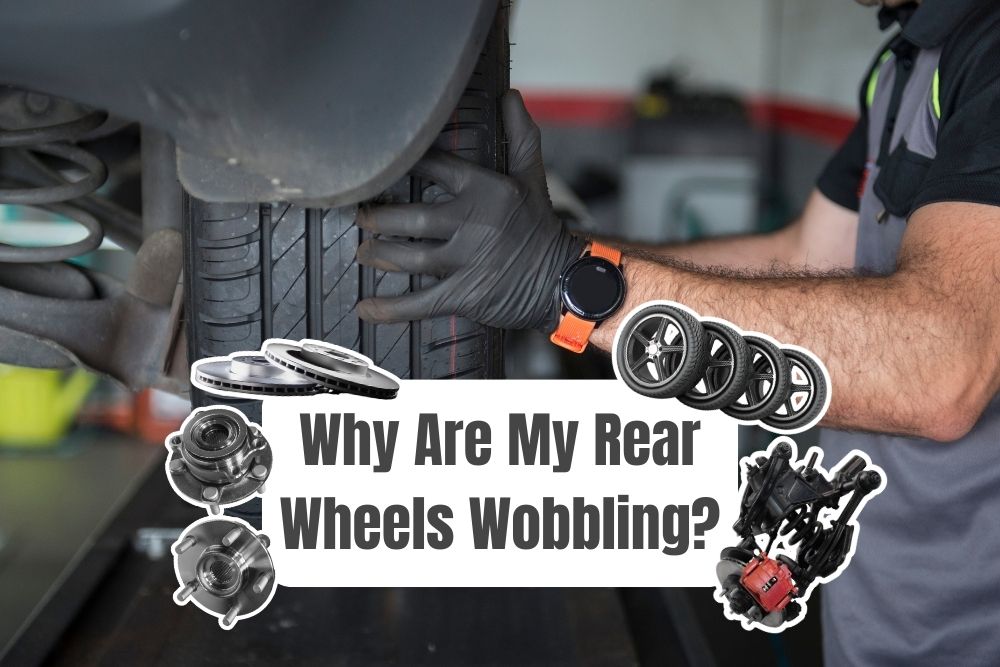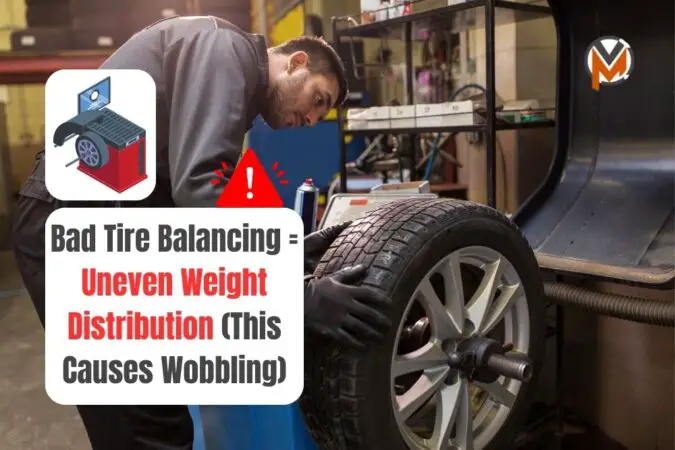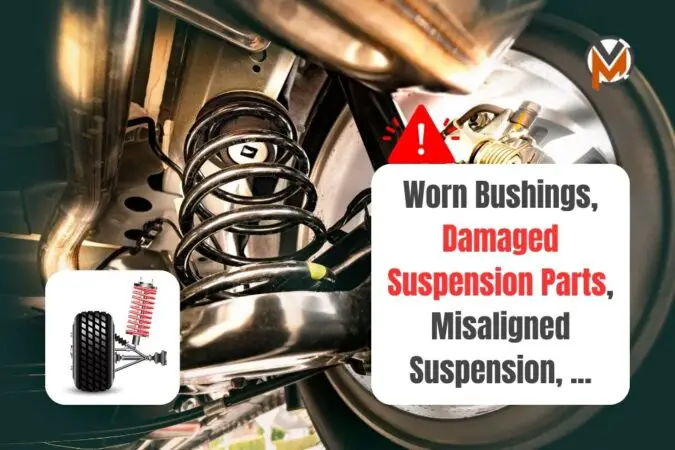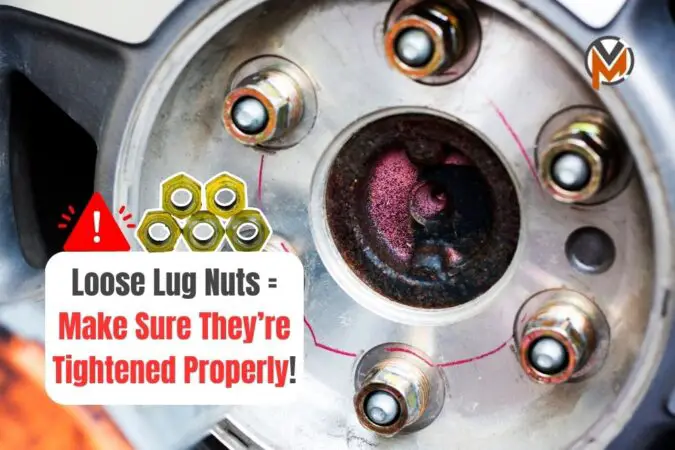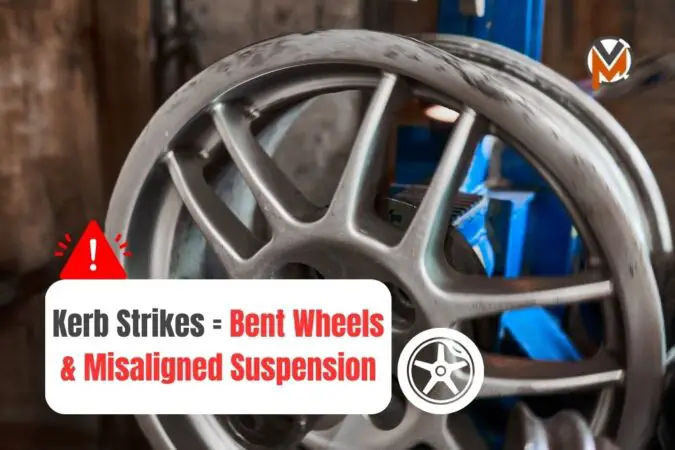As I’ve seen countless times prior, there are certain faults in a car that are mere inconveniences. But, there are also those subtle issues that could otherwise prove deadly. So, why is my car’s back wheel wobbling?
There could be numerous reasons and causes why your car’s rear wheels are wobbling around while you’re driving. The usual culprits are unbalanced tires, poor wheel alignment, and a lack of proper tire rotation.
Otherwise, physical damage to your wheels/rims, suspension problems, faults with your brake system, and loose lug nuts, as well as bad wheel bearings, or even curb strikes can cause your rear wheels to wobble.
Here are 7 common causes and reasons on why is my back wheel wobbling around while driving:
- Wheel and tire imbalance
- Physical wheel damage
- Suspension-related issues
- Brake system complications
- Loose lug nuts
- Wheel bearings wear & tear
- Curb strikes
Reason #1: Wheel And Tire Imbalance
One of the most common causes of rear wheel wobble is an imbalance in the wheels and tires. This can or would normally occur when the weight distribution around your car’s wheels is uneven.
This is often due to a loss or misplacement of balancing weights. Unbalanced wheels can cause vibrations, especially noticeable at higher speeds. This further highlights the importance of tire balancing.
When the tires are replaced or rotated, it’s important to ensure that they’re balanced correctly. Balancing involves adding small weights to the wheel to ensure even weight distribution.
If these balancing weights are lost or are incorrectly placed, it can lead to wobbling. Regular checks and rebalancing on your car every once in a while when it’s necessary can prevent this issue.
Reason #2: Physical Wheel Damage
Damage to your wheels, like bends and warps, often caused by impacts like hitting curbs or potholes, can lead to wobbling. Even minor damage can have a significant impact on wheel balance and alignment.
While slight damage, even if it may appear only cosmetic in nature, might not seem severe, it could be consequential when your wheels are rotating as you’re driving around.
Therefore, make it a habit to inspect your wheels regularly for any signs of damage. If the wheel is bent or warped, it may need to be repaired. Or, if the damage is serious, it needs to be replaced.
Sometimes, the damage might not be visible to the naked eye, such as internal damage that impacts their structural integrity. As such, a professional inspection can be beneficial if wheel damage is suspected.
Reason #3: Suspension-Related Issues
Problems with your car’s suspension, such as any worn-out bushings, damaged suspension components, or misaligned suspension, can cause rear wheel wobble. This is more prominent when you’re driving.
Your car’s suspension system plays a vital role in maintaining proper wheel alignment and vehicle stability. Regular inspections of your suspension could help identify issues with suspension components.
Symptoms of suspension problems include uneven tire wear, noise while driving, and noticeable changes in handling. In cases of severe damage, parts of the suspension system may need to be replaced.
Reason #4: Brake System Complications
Issues with your braking system, such as warped brake rotors or malfunctioning brake calipers, can lead to uneven braking pressure. Thus, this will result in wheel wobble, particularly noticeable when braking.
If you experience wobbling mainly during braking, this could indicate a problem with your car’s brakes. This can be deadly, as prolonged inaction can cause reduced brake distances and poor braking performance.
With that in mind, regular brake inspections and maintenance, including checking your brake pads, rotors, and calipers, are essential for identifying and fixing these issues in a timely manner.
Reason #5: Loose Lug Nuts
Sometimes, the cause of rear wheel wobble is as simple as some loose lug nuts. If the lug nuts that secure the wheel to your car are not tightened properly, it can lead to significant wobbling, if they’re loose.
Regularly check to ensure that all your lug nuts are tightened to the car manufacturer’s specifications. This is a simple yet vital step in maintaining wheel stability and should be part of routine vehicle servicing.
Reason #6: Wheel Bearings Regular Wear & Tear
Worn or damaged wheel bearings can also cause wheel wobble. These bearings are essential for smooth wheel rotation and, when faulty, can lead to significant stability issues with your car.
Symptoms of bad wheel bearing problems include a grinding noise or a feeling of looseness in the wheel. If you suspect wheel bearing problems, it’s important to have them inspected and replaced if necessary.
Reason #7: Kerb Strikes
Hitting a curb hard enough can readily cause immediate and significant damage to both your car’s wheels and suspension. The impact can bend rims and misalign suspension components, leading to wobble.
The side effects and consequences are similar to the wheel damage that we mentioned earlier. So, be cautious when you’re driving near curbs and during parking to prevent curbing your car’s wheels.
If you’ve just had a curb strike, inspect your wheels and suspension for any signs of damage. In some cases, professional repairs might be necessary, especially if the damage causes structural compromises.

